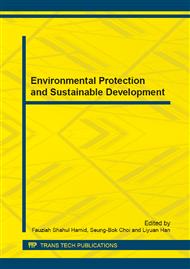p.699
p.709
p.713
p.721
p.725
p.729
p.735
p.741
p.745
Coral Reefs Damage Assessment due to Oil Pollution in Egyptian Water
Abstract:
Coral reefs are the most biological systems productive and versatile on the surface of the planet earth, which is a source with economic and social, returns great for the country that God-given this natural wealth. Egypt is home to some of the most spectacular coral reefs and associated marine life in the world. Egypt has enacted laws and takes effective measures for the protection and management of coral reefs and associated ecosystems in the Red Sea and its Gulf to characterize these areas of the richness and diversity of coral reef environment is scarce to be repeated elsewhere in the world. The largest sub-sector for the Egyptian tourism market is the coastal tourism. Coastal tourism depends largely on intact reefs, and this is also one of the most important causes of reef degradation in Egypt. Over the last two decades live coral cover has declined in Egypt. Egyptian Environmental Affairs Agency (EEAA) implements its own methodology to estimate the coral reefs impacts as a result of the destruction of coral reefs due to ship aground or anchorage. This paper focuses on and presents the modelling of the destruction of coral reefs as a result of the collision and the ship ground damage assessment in case of oil spills in Egyptian coastal water referring to the EEAA methodology applied in Egypt.
Info:
Periodical:
Pages:
725-728
Citation:
Online since:
February 2014
Keywords:
Price:
Сopyright:
© 2014 Trans Tech Publications Ltd. All Rights Reserved
Share:
Citation:


